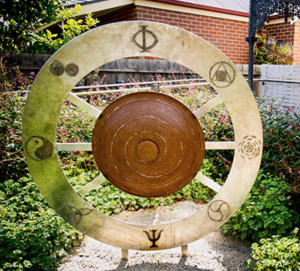How can we improve health services across the board? A number of local health professionals in Geelong recently met to discuss this issue. The discussion was especially refreshing as we considered alternatives that wouldn’t require further funding or political support. This might be the way of the future given greatly rising health costs.
A common view is that patients would benefit from more holistic and integrated services. Health providers too often function as individual silos, dispensing interventions without taking into account what others might be doing. However, health services vary greatly in treatment models and language. There can be a world of difference between psychology and psychiatry, let alone general practice and naturopathy. How can we hope to integrate efforts across the health professions?
I believe any attempt to promote truly holistic health services would require some shared focus on aspects of health that relate to body, mind and soul. For what they’re worth, these are some of my musings.
We could start with the body. One common theme for virtually all areas of health is the universal and specific benefits of physical exercise. It would cost little, and generally be relevant for health professionals of all persuasions, to encourage our clients to be physically active. Encouraging exercise also symbolically reminds people of the importance of taking an active role in their own treatment. A good diet is also important in all areas of health, as is further made clear from our increasing understanding of the gut microbiome.
With regards to the mind, the one universal seems to be the benefit of adopting an optimistic outlook. This is because our mind and body are so closely related in all health and illness. Placebo effects are real and biologically powerful. Our mindset can literally make us better or worse. All health professionals can help improve outcomes at no extra cost by minding our language. We can offer explanations for health problems that fit the facts, but which encourage resourcefulness and hope.
For example, regardless of whatever treatment is offered, we can resist the old standard explanations that those suffering from depression have a biochemical imbalance caused by faulty genes which primarily requires medication – an external fix. That’s unnecessarily pessimistic.
By contrast, we can advise someone who is depressed that they are likely to fully recover whilst acknowledging their personal strengths and supports. Medication may be a helpful component, especially if the person’s depression persists or is severe. Optimistic language encourages hope, bolsters immunity, and promotes a patient’s active involvement in treatment. It works better, but costs nothing more.
To be truly holistic, we might acknowledge the soul. This remains remarkably out of fashion in psychology and particularly psychiatry, even though the historical roots of these words suggest that they relate to the “study of the soul” and “soul doctoring”.
We don’t have to be religious fanatics to consider the notion of soul. We just have to be open to there being a deeper level of awareness beyond the usual conscious realm. I believe that partly relates to deep intuition. I feel it helps if health professionals are open to our own and our client’s intuition as an additional important source of information.
For mental health in particular, it can also be important to be open to discussing our clients’ spiritual beliefs, including their values and sense of life purpose. Conflicts at that level can show up as psychological and physical problems, but are too often ignored.
That is one reason why I am personally and professionally interested in synchronicity, or an uncanny and meaningful timing of events that compellingly seems to go beyond chance. Many people describe ways in which remarkable synchronistic experiences have shaped their life path, in a way that seemed “meant to be”. They might keep these experiences private, perhaps especially from health professionals, as such beliefs may not appear rational. However, they can be of immense personal significance, often reinforcing one’s sense of fate, or destiny, or life purpose. Synchronistic experiences are often appreciated as being a “tick from the universe” that you are on the right track in your life, as they occur more often when well attuned with yourself at a soul level.
Synchronicity is just one way, including a secular way, of tapping into a spiritual dimension in one’s life. It is a particularly accessible way of doing so, as many people acknowledge having such experiences as thinking of a person and then encountering them immediately afterward, or improbably receiving a call from someone you were about to contact. Such experiences enhance our sense of connectedness with the world and with others, an important component of good mental health. I believe we shall increasingly come to accept that anything that is good for our mental health, such as explicitly acknowledging a spiritual dimension in life, is also a good thing for our physical health.
For further articles on synchronicity, see www.synchronicityunwrapped.com.au

